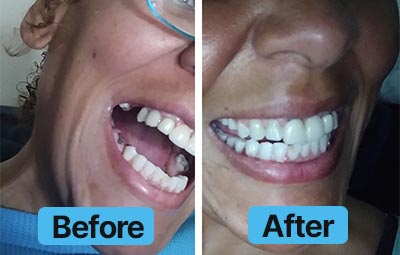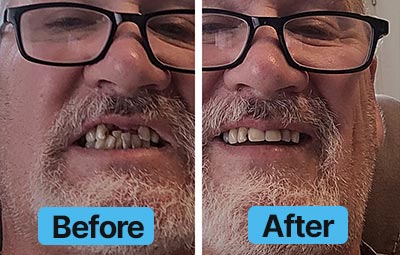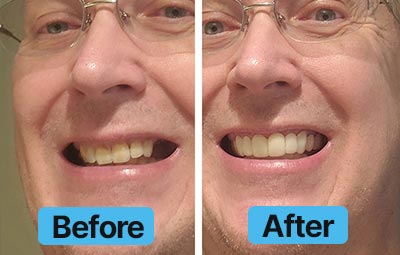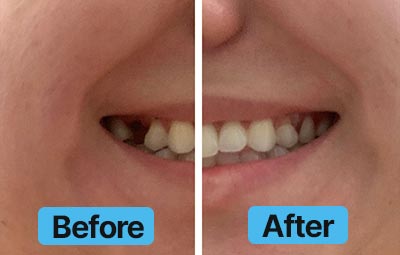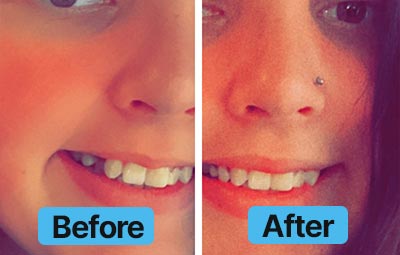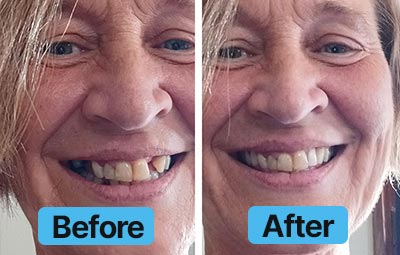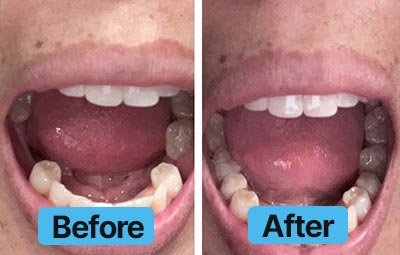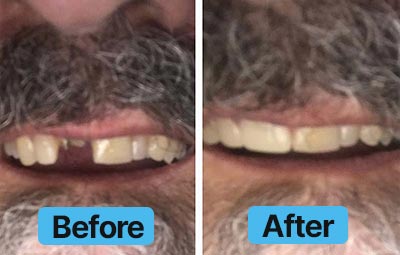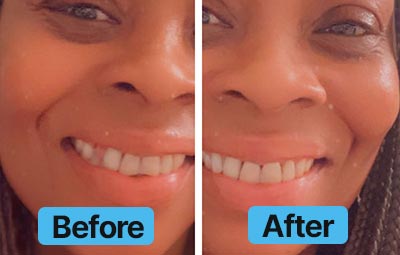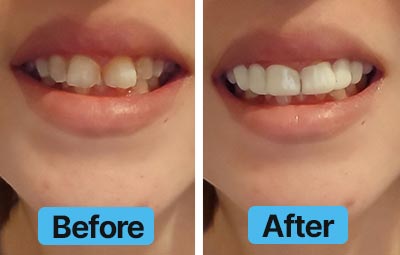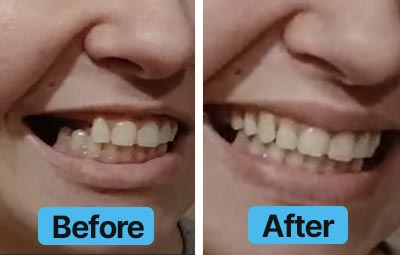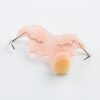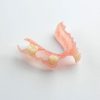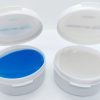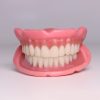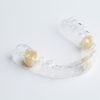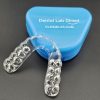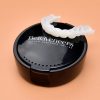Transitioning from having teeth to no teeth, to dentures can be a big adjustment, especially for first-time wearers. In fact, more than 36 million Americans have no natural teeth, 120 million are missing at least one tooth, and about 90% of them use dentures, according to the American College of Prosthodontists.
So basically, you’re not alone in learning the ropes, no matter if you have partial dentures or full dentures. If you follow our seven tips for wearing new dentures, it will help you break in your new smile with confidence and ease.
What to Expect with New Dentures
New dentures often feel strange or loose at first, and minor soreness or extra saliva is not unusual in the first few weeks. Your cheeks, tongue, and gums need to “learn” how to keep the dentures in place, so it makes sense that you might experience some irritation to start with, but this should fade as your mouth becomes accustomed.
At first, activities like speaking and eating with dentures will require you to practice. You might feel self-conscious, but keep in mind this is temporary.
According to the American Dental Association, initial denture soreness and awkwardness won’t last forever. And many people tend to experience a massive improvement to their quality of life once they adjust to dentures, so stick with it.
Our Best Tips for Wearing New Dentures
Now that we’ve gotten what to expect out of the way, here are seven tips for wearing new dentures that will surely make the transition easier.
1. How and What to Eat with Dentures
Our first tip for wearing new dentures is to try eating only soft, easy-to-chew foods (like yogurt, soup, mashed vegetables, and scrambled eggs) and cut food into small pieces. Chew slowly and use both sides of your mouth at the same time to keep your denture stable.
Avoid tough, hard, or sticky foods in the beginning. If you have peanut brittle or chewy candy in your pantry, consider it gone. These sticky, hard treats can dislodge dentures, and if you’re unlucky, it can cause sore spots.
Even hot liquids should be sipped carefully since the dentures can insulate your mouth (meaning, you may not be able to sense heat properly.
According to the ADA, you can work your way up from soft foods to more challenging items like red meat or apples by taking it slow and using your canine teeth to bite (rather than front teeth, which can destabilize the denture).
Over a few weeks, eating with dentures will feel more natural.
2. Best Way to Speak with New Dentures
It’s common to have slight lisping or difficulty pronouncing certain words at first. A great remedy is to practice speaking out loud in the comfort of your home. Try reading a book or singing along to your favorite song. Singing, in particular, can help you articulate words smoothly and build confidence in your speech.
Some denture wearers find that speaking slowly at first prevents clicking sounds. Over time, your tongue and lips will adjust to the new teeth shape, and your natural speech will return.
What this means is that you shouldn’t be afraid to talk to family or even to yourself. Despite feeling a bit silly, especially when talking to yourself, these things are necessary to practice and get better over time.
3. Clean Your Dentures Routinely
Just like natural teeth, if you want to keep your dentures clean and free of bacteria, you will need to care for them daily.
Remove your dentures after meals if possible and rinse them to wash away food particles. At least once a day (preferably at night), brush your dentures with a soft-bristle brush by using a gentle cleanser. Regular toothpaste might be too abrasive and can scratch the denture surface, so make sure the cleanser is specifically for dentures or is a mild soap.
It’s best to do this cleaning over a folded towel or basin of water in case you accidentally drop them (dentures can crack if dropped on a hard surface).
4. Don’t Neglect Your Current Teeth
Even if you wear full dentures, you still need to care for your mouth.
Use a soft toothbrush or damp cloth to gently brush your gums, tongue, and the roof of your mouth every morning before putting in your dentures to clear out plaque and stimulate circulation in your oral tissues.
If you have partial dentures, also brush and floss your natural teeth while paying special attention to areas where the denture clasps onto your teeth, since food can get trapped there.
5. Soak Your Dentures Overnight
Most dentists recommend taking your dentures out while you sleep (or for at least 8 hours in every 24-hour period) to give your gum tissues a chance to rest and prevent soreness.
When you remove your dentures, place them in water or a denture cleaning solution overnight. Keeping them moist prevents the material from drying out and warping.
You can use an effervescent denture cleanser tablet a few times a week to help kill bacteria and remove stains. Just follow product instructions and never use hot or boiling water since that could deform the denture. You can also use a cordless personal sonic cleaner, too!
6. Use Adhesives
Denture adhesives (creams, powders, or adhesive pads) can give you extra grip, especially for lower dentures or while you’re still adjusting.
Keep in mind that adhesives are meant to supplement a well-fitting denture, not fix a poor fit. If you find yourself needing large amounts of adhesive or reapplying it multiple times a day, that’s a sign your dentures need adjustment or relining.
7. Don’t Ignore Constant Discomfort
Some tenderness is normal in the beginning. Lots of people experience it, unfortunately. But persistent or intense pain should be looked into.
If you develop a sore spot with new dentures on your gums, try rinsing your mouth with warm saltwater, which can promote healing. You can also use over-the-counter oral gels (like those for mouth ulcers) to numb a particularly tender area or take a mild pain reliever if needed (always follow dosage guidelines).
The last of our tips for wearing new dentures is that you should stop if the discomfort becomes unbearable. Dentures should not be continuously painful.
Final Thoughts: Embrace Your New Dentures with Confidence
Adjusting to dentures takes time, but with these expert tips for wearing new dentures, you’ll soon regain comfort and confidence.
Ready to take the next step? Explore affordable, custom-fit full dentures or partial dentures from Dental Lab Direct delivered right to your door.
 60 DAY warranty on all custom-made products | 1,000+ 5 Star ★★★★★ Reviews
60 DAY warranty on all custom-made products | 1,000+ 5 Star ★★★★★ Reviews

